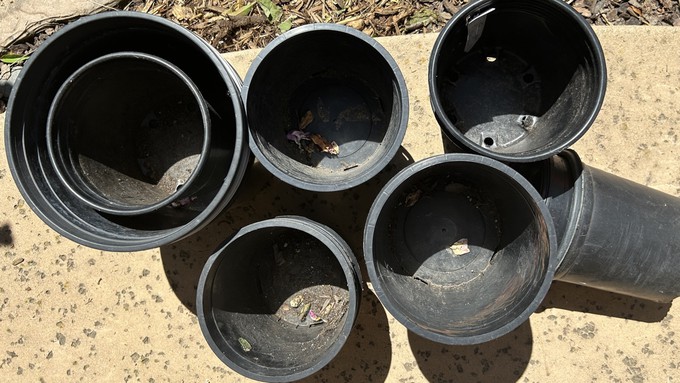
Ways to cut down on plastics in your own landscape

These sturdy 1- and 2-gallon planting pots can be recycled and reused, at home, at a community garden or local nonprofit group that propagates plants, or through businesses such as Home Depot. Kathy Morrison
Today, April 22, people around the globe commemorate Earth Day, one of the world’s longest-running environmental awareness campaigns. Since 1970, Earth Day has spotlighted major issues affecting our planet and the ways individuals can tackle solutions at the grassroots level.
An estimated 1 billion people representing 190 countries will take part in some sort of Earth Day activity this year, according to the Earth Day Network.
The 2024 theme: “Planet vs. Plastics.” The proposed goal: Reduce the production of plastics by 60% by 2040.
“Our theme, ‘Planet vs. Plastics,’ calls to advocate for widespread awareness on the health risk of plastics, rapidly phase out all single-use plastics, urgently push for a strong U.N. Treaty on Plastic Pollution, and demand an end to fast fashion,” says EarthDay.org. “Join us as we build a plastic-free planet for generations to come!”
For example, plastic represents 80% of marine trash, note Earth Day experts. Besides polluting rivers and oceans, plastic waste has negative impacts on wildlife. A recent study showed that birds accidentally eat a lot of plastic, especially those living near water. About 90% of seabirds consume plastic as part of their daily diet, which can lead to disease and death, says the National Geographic. (Plastic does not digest.)
For gardeners, every day can be Earth Day. How can you reduce the use of plastics in your garden?
* No black plastic mulch or landscape fabric. Designed to cut down on weeds, black plastic absorbs too much heat and cooks the roots of plants that it surrounds. And it does nothing for the soil while eventually ending up in landfills. Organic alternatives – such as dried leaves, wood chips, compost, shredded bark or straw – do more than suppress weeds; they also feed the soil and roots while retaining soil moisture and keeping roots comfortable.
* Reuse and recycle plastic pots. The sturdy 1- or 5-gallon pots that come with new plants can be reused for years. If you have too many, don’t toss them. Ask your local nursery or community garden if they need them. These pots are recyclable. The Home Depot launched a recycling program to accept any plastic garden containers (not just the big pots and regardless of their point of purchase). Look for the green recycling signs in Home Depot nursery departments.
* Use plastic alternatives. Instead of plastic pots, use egg cartons, cardboard or paper pots to grow seedlings.
* Cut down on garden chemicals. The more chemicals you use, the more plastic containers that pile up in your garden shed. Eliminate the use of pesticides and herbicides in your garden, and your plastic use goes down, too.
* Pay attention to packaging. Buy plants grown in paper pots. Select fertilizers or amendments packaged in paper or cardboard. (Note: Rodents will chew on paper containers given a chance. A large covered plastic tub for storage can act as a barrier and still cut down on the other plastic use).
For more inspiration: https://www.earthday.org/.
Comments
0 comments have been posted.Sacramento Digs Gardening to your inbox.
Sites We Like
Garden Checklist for week of July 21
Your garden needs you!
* Keep your vegetable garden watered, mulched and weeded. Water before 8 a.m. to reduce the chance of fungal infection and to conserve moisture.
* Feed vegetable plants bone meal, rock phosphate or other fertilizers high in phosphate to stimulate more blooms and fruiting. (But wait until daily high temperatures drop out of the 100s.)
* Don’t let tomatoes wilt or dry out completely. Give tomatoes a deep watering two to three times a week.
* Harvest vegetables promptly to encourage plants to produce more. Squash especially tends to grow rapidly in hot weather. Keep an eye on zucchini.
* Pinch back chrysanthemums for bushy plants and more flowers in September.
* Remove spent flowers from roses, daylilies and other bloomers as they finish flowering.
* Pinch off blooms from basil so the plant will grow more leaves.
* Cut back lavender after flowering to promote a second bloom.
* It's not too late to add a splash of color. Plant petunias, snapdragons, zinnias and marigolds.
* From seed, plant corn, pumpkins, radishes, winter squash and sunflowers.